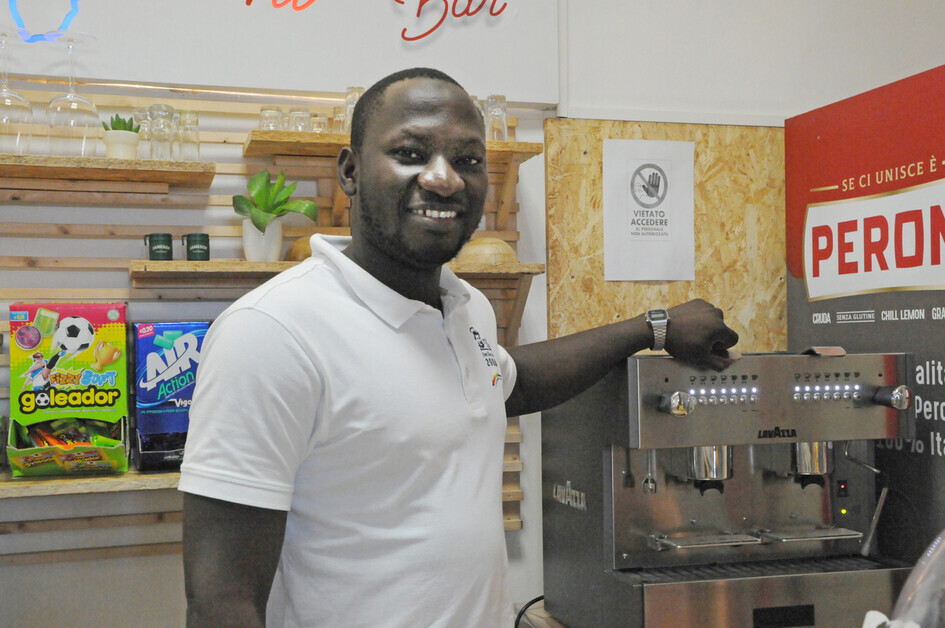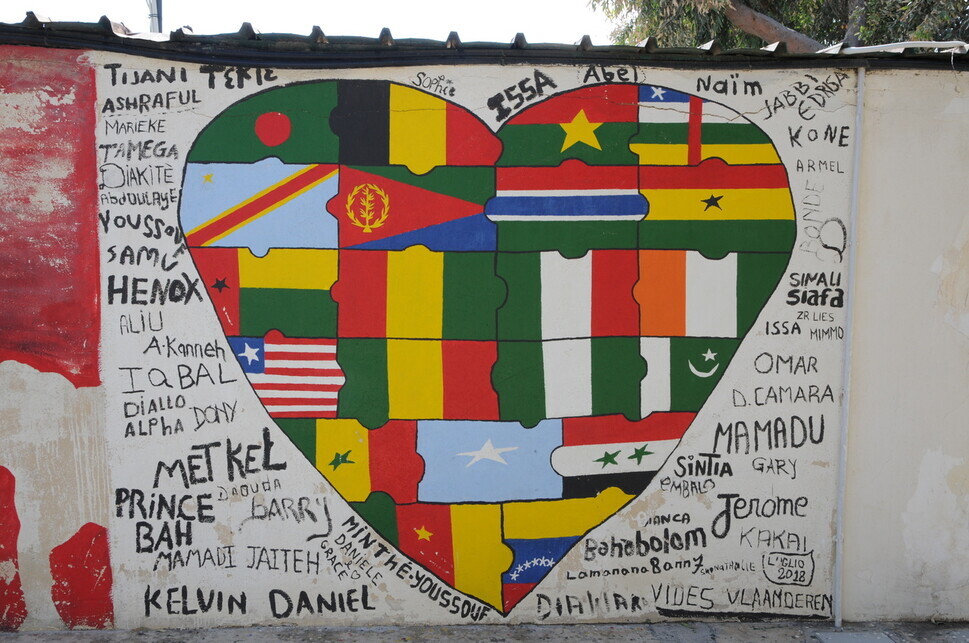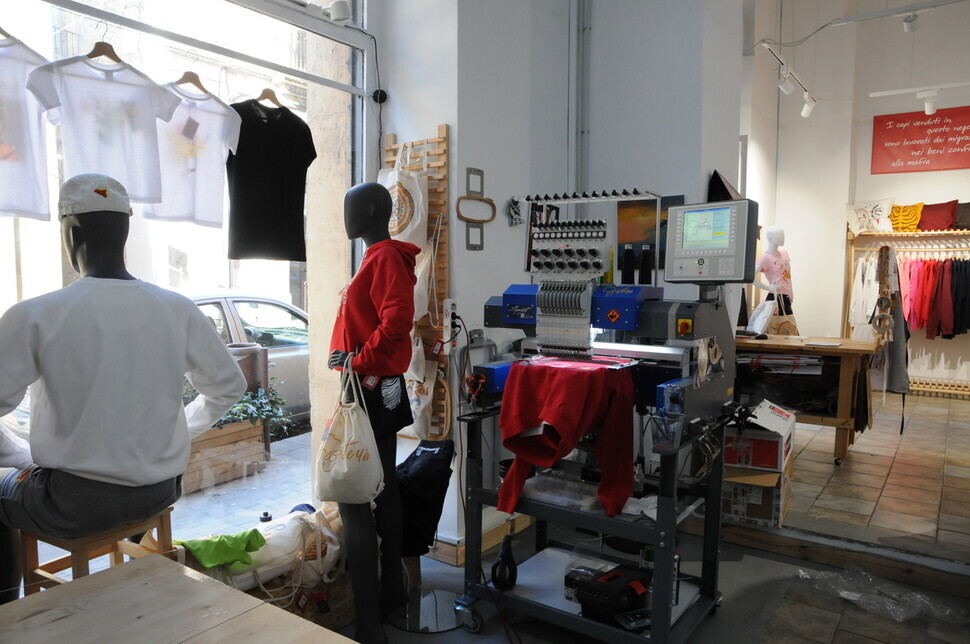hankyoreh
Links to other country sites 다른 나라 사이트 링크
[Reportage] African migrants cultivate self-sufficiency on land once used by Sicilian Mafia

“Gambia, Nigeria, Kenya, Senegal, Bangladesh — friends from different countries are the ones running the hostel.”
The Beteyà Hostel in Catania, Sicily’s second-largest city, seemed to have a different kind of feel when I visited on Oct. 6.
All around the building were rainbow-patterned flags bearing the Italian word “pace,” meaning “peace.” On one of the walls was a painting showing the flags of various African countries in a large heart pattern.
One of those flags was that of Mali, with its three vertical stripes of green, yellow and red. Mali is the home country of the hostel’s reception manager, 32-year-old Aly Traoré.
Ten of the 14 employees working at Beteyà are immigrants like Traoré. The hostel’s building previously served as the primary reception center for immigrants between 2015 — when the first refugee crisis visited Europe — and 2018.
But after the Italian government slashed the related budget in 2018, it was converted into an ordinary hostel. The same migrants who stopped at the center on their way to a new life have since converted it into a hotel that is visited by tourists from around the world.
Traoré left his homeland of Mali and traveled through Algeria and Libya before reaching Catania in 2014. At the time he made up his mind to emigrate, he was a 23-year-old who had majored in Arabic literature in college.
The turning point in his life came with the civil war that erupted in Mali in 2012. Abandoning everything, he made the decision to leave his country.
His first stop was Algeria. After earning money there, he traveled to Libya, where he used his savings to journey to Europe on a boat provided by smugglers. He paid the equivalent of 1,000 euros for the privilege of squeezing onto a small plastic vessel with 104 other people.
“At first, I didn’t realize that was the kind of boat we would be traveling on,” he said. “But I couldn’t just refuse to board it. If I did, [the smugglers] might point a gun at me or beat me up, or even kill me.”

These days, the situation is well known on account of social media and other channels. But at the time, immigrants did not have access to that sort of information.
A first attempt to cross over to Europe was thwarted by the Libyan coast guard. On the second attempt, the boat lost its way and wandered for two days on the sea before luckily being rescued by a large Indian fishing boat.
Traoré was able to communicate in various other languages besides Bambara (the language of the Bambara people in Mali and its surrounding region) and Soninke (the language of the Soninke people in northwestern Africa), including English, Arabic and French. So after arriving in Italy, he was able to start working as an interpreter for Don Bosco 2000, the social enterprise operating the migrant assistance facility where he was staying.
He also went back to school. Since the immigrant assistance center in Catania was converted into a regular hostel due to a lack of funding, he has been in charge of the front desk there.
Don Bosco 2000, the organization that helped him start a new life in Europe, is a social enterprise founded in 1998. It was named after St. John Bosco (1815–88), founder of the Salesian order of the Catholic Church. It currently operates 15 migrant assistance centers in Sicily.
Once immigrants have arrived at one of the “hot spots” (primary reception centers) such as the island of Lampedusa and undergone identity verification procedures, they travel to a secondary facility where they complete asylum application procedures, which can take up to two years.
Currently, around 1,000 immigrants from various countries — including many Sub-Saharan African and Asian countries — are living at centers operated by Don Bosco 2000. Its basic role is to provide accommodations to them along with integrated assistance with document preparation, language study, and other areas.
But Don Bosco 2000 also goes the extra mile by operating a development cooperation program for the poorest countries, employing the concepts of “cyclical collaboration” and the “work corridor.” This system is designed to allow immigrants to acquire various skills while working at the centers, which they can use to start their own businesses after returning to their home countries.

It’s a mutually beneficial model that treats immigrants as more than just beneficiaries of charity: it puts their labor capabilities to work toward operating a social enterprise and ultimately assisting with economic development in Africa. Indeed, around a dozen immigrants have returned home and started businesses with skills that they learned here.
Don Bosco 2000 is working with around 40 immigrants in various areas, including agriculture, clothing production, and sales. Its programs even include sales of crops harvested on land confiscated from the Mafia by the Italian government.
In the case of clothing production, the immigrants make the designs themselves by combining African and European colors, after which they create the garments on their sewing machines and sell them. Ten percent of the profits from the clothing store go toward a chicken coop installation project in Africa.
The enterprise also assists immigrants with job placement. This year, around 40 labor contracts have been signed by immigrants in Sicily alone.
“Our activities go above and beyond simply ‘welcoming’ people,” said Roberta La Cara, who has worked for the last decade as a project coordinator for Don Bosco 2000.
“Since these immigrants have come here to work for money to send to their families, our job is about helping them achieve self-sufficiency,” she explained.
By Noh Ji-won, Berlin correspondent
Please direct questions or comments to [english@hani.co.kr]

Editorial・opinion
![[Column] Life on our Trisolaris [Column] Life on our Trisolaris](https://flexible.img.hani.co.kr/flexible/normal/500/300/imgdb/original/2024/0505/4817148682278544.jpg) [Column] Life on our Trisolaris
[Column] Life on our Trisolaris![[Editorial] Penalties for airing allegations against Korea’s first lady endanger free press [Editorial] Penalties for airing allegations against Korea’s first lady endanger free press](https://flexible.img.hani.co.kr/flexible/normal/500/300/imgdb/original/2024/0502/1817146398095106.jpg) [Editorial] Penalties for airing allegations against Korea’s first lady endanger free press
[Editorial] Penalties for airing allegations against Korea’s first lady endanger free press- [Editorial] Yoon must halt procurement of SM-3 interceptor missiles
- [Guest essay] Maybe Korea’s rapid population decline is an opportunity, not a crisis
- [Column] Can Yoon steer diplomacy with Russia, China back on track?
- [Column] Season 2 of special prosecutor probe may be coming to Korea soon
- [Column] Park Geun-hye déjà vu in Yoon Suk-yeol
- [Editorial] New weight of N. Korea’s nuclear threats makes dialogue all the more urgent
- [Guest essay] The real reason Korea’s new right wants to dub Rhee a founding father
- [Column] ‘Choson’: Is it time we start referring to N. Korea in its own terms?
Most viewed articles
- 160% of young Koreans see no need to have kids after marriage
- 2New sex-ed guidelines forbid teaching about homosexuality
- 3[Column] Life on our Trisolaris
- 4S. Korea discusses participation in defense development with AUKUS alliance
- 5Hybe-Ador dispute shines light on pervasive issues behind K-pop’s tidy facade
- 6Months and months of overdue wages are pushing migrant workers in Korea into debt
- 7[Reporter’s notebook] In Min’s world, she’s the artist — and NewJeans is her art
- 8Presidential office warns of veto in response to opposition passing special counsel probe act
- 9Japan says it’s not pressuring Naver to sell Line, but Korean insiders say otherwise
- 10[Editorial] Penalties for airing allegations against Korea’s first lady endanger free press